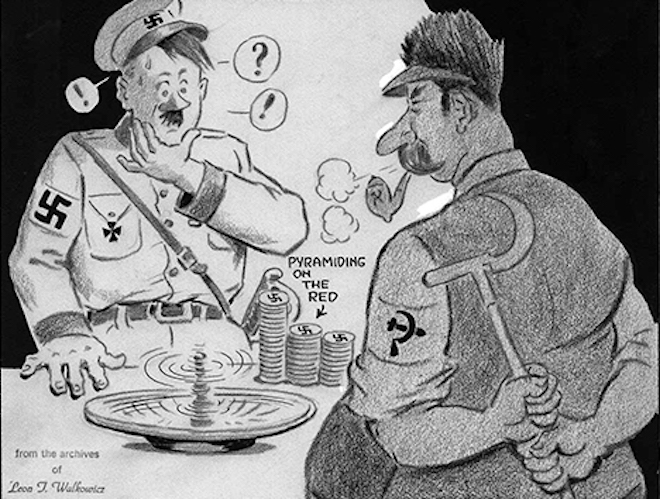Russian historians, acolytes of Vladimir Putin, have stated that “Stalin had no choice, the West and Poland were to blame, and countries neighbouring Russia who oppose it deserve whatever fate Russia imposes on them, including dismemberment and annexation”.
In a 2015 press conference with German Chancellor Angela Merkel, Putin unapologetically defended the Pact, which “made sense for ensuring the security of the Soviet Union”. Kremlin spokesmen have claimed that the MRP was a “great achievement of Soviet diplomacy”.
However, historians at Russia’s Memorial foundation, a citizen’s group which exposes the USSR’s repressions, have stated that the Secret Protocols of the MRP not only determined the spheres of influence of Eastern Europe, “it occupied and destroyed the independence of neighbouring states – a crime against international law”.
The MRP has had a convoluted history in the Soviet Union and Russia. After the US released a copy that had been captured from the Germans, Moscow still kept on insisting that the Secret Protocols didn’t exist. But in December 1989, the Soviet Congress of People’s Deputies condemned the agreement in a formal resolution. Up until then, Moscow denied the existence of the Protocols and used the lack of this text to challenge the German originals which had been available to scholars since the late 1940s.
The document itself was only made public in 1992, but only the Soviet’s own translation of the documents. It wasn’t until late May of this year that the Russian portal ‘Istoricheskaya pamyat’ published actual photocopies of the Russian originals of the Pact. It should be now improbable that Russian officials could deny the existence of such an aggressive secret collusion, even though the current and historical Kremlin narrative has consistently stressed the utmost necessity for, and the inevitability of the agreement being struck.
This August 23rd marked ten years since 2009 when the European Union officially started to commemorate the day as A Day of Remembrance. Canada and the US also have officially designated the day similarly, although here and in many places worldwide, the day is more widely known as Black Ribbon Day. We do remember that the Black Ribbon Day movement was initiated from Toronto and the activities in over sixty cities were co-ordinated from there as well.
The movement was able to explain to Western politicians, media and the public at large that the MRP, seen by many as a minor, obscure document, had a more much powerful impact on the start of the war, its conclusion and its legacy of today. Even Russian historians who aren't swept up in the Kremlin propaganda admit that the division imposed on Europe in the 1939 accord will never be fully be closed up. Russia continues to favour such a divide and uses the most brazen distortions of history to promote it.
Laas Leivat, Toronto




